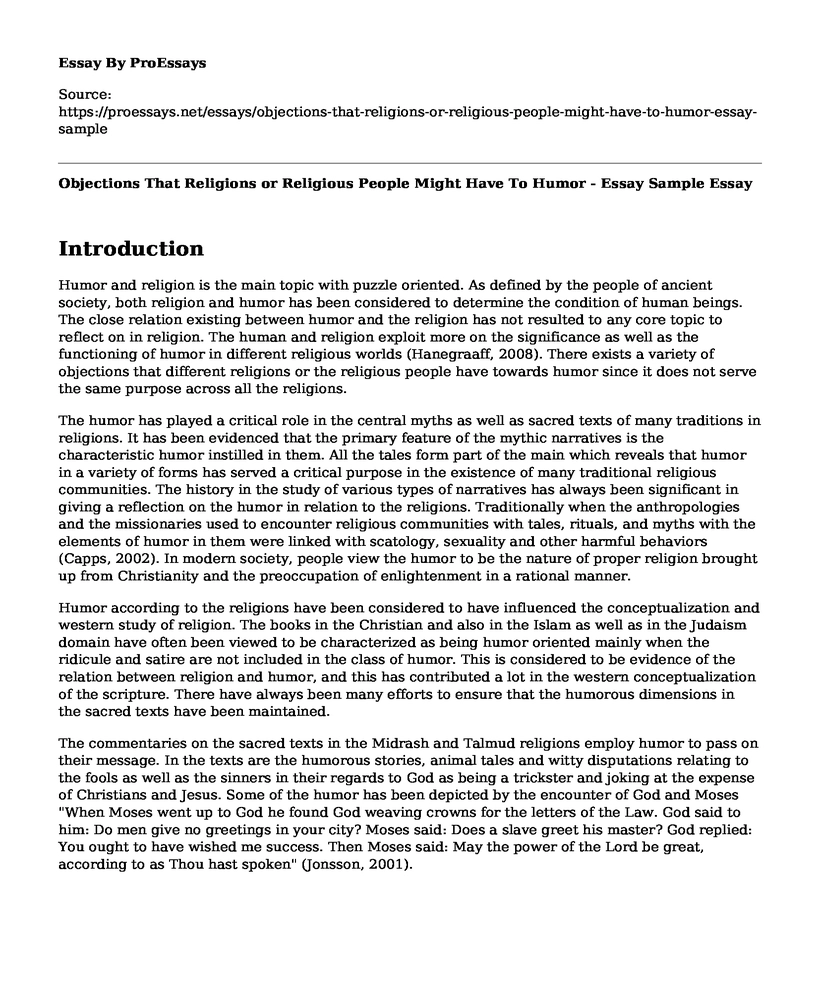Introduction
Humor and religion is the main topic with puzzle oriented. As defined by the people of ancient society, both religion and humor has been considered to determine the condition of human beings. The close relation existing between humor and the religion has not resulted to any core topic to reflect on in religion. The human and religion exploit more on the significance as well as the functioning of humor in different religious worlds (Hanegraaff, 2008). There exists a variety of objections that different religions or the religious people have towards humor since it does not serve the same purpose across all the religions.
The humor has played a critical role in the central myths as well as sacred texts of many traditions in religions. It has been evidenced that the primary feature of the mythic narratives is the characteristic humor instilled in them. All the tales form part of the main which reveals that humor in a variety of forms has served a critical purpose in the existence of many traditional religious communities. The history in the study of various types of narratives has always been significant in giving a reflection on the humor in relation to the religions. Traditionally when the anthropologies and the missionaries used to encounter religious communities with tales, rituals, and myths with the elements of humor in them were linked with scatology, sexuality and other harmful behaviors (Capps, 2002). In modern society, people view the humor to be the nature of proper religion brought up from Christianity and the preoccupation of enlightenment in a rational manner.
Humor according to the religions have been considered to have influenced the conceptualization and western study of religion. The books in the Christian and also in the Islam as well as in the Judaism domain have often been viewed to be characterized as being humor oriented mainly when the ridicule and satire are not included in the class of humor. This is considered to be evidence of the relation between religion and humor, and this has contributed a lot in the western conceptualization of the scripture. There have always been many efforts to ensure that the humorous dimensions in the sacred texts have been maintained.
The commentaries on the sacred texts in the Midrash and Talmud religions employ humor to pass on their message. In the texts are the humorous stories, animal tales and witty disputations relating to the fools as well as the sinners in their regards to God as being a trickster and joking at the expense of Christians and Jesus. Some of the humor has been depicted by the encounter of God and Moses "When Moses went up to God he found God weaving crowns for the letters of the Law. God said to him: Do men give no greetings in your city? Moses said: Does a slave greet his master? God replied: You ought to have wished me success. Then Moses said: May the power of the Lord be great, according to as Thou hast spoken" (Jonsson, 2001).
Conclusion
In conclusion, it is true that various religions and people have a different view on the impact of humor in their contexts. Viewing the religion from an external perspective many people have critically analyzed on the way in which religion interacts with the humor in any society as a way of attaining the set goals by every religion. However, according to the philosophers (i.e., Plato, Aristotle, Cicero), there exist some theoretical charges against humor. Two of the theories were considered as the main which included the superiority theory, where humor was considered as irresponsible and hostile (McDannell, 1998). The incongruity and the relief theory where humor was view as the enjoyment of things which violated the normal psychological expectations and patterns of religion.
References
Hanegraaff, W. J. (2008). New age religion and western culture: Esotericism in the mirror of secular thought (Vol. 72). Suny Press.
Capps, D. (2002). Men and their religion: Honor, hope, and humor. Bloomsbury Publishing.
Jonsson, Kathleen M, 2001. "Humor." In Encyclopedia of Women and World Religion, edited by Serinity Young, vol. 1. New York,
McDannell, C. (1998). Material Christianity: Religion and popular culture in America. Yale University Press.
Cite this page
Objections That Religions or Religious People Might Have To Humor - Essay Sample. (2022, Nov 15). Retrieved from https://proessays.net/essays/objections-that-religions-or-religious-people-might-have-to-humor-essay-sample
If you are the original author of this essay and no longer wish to have it published on the ProEssays website, please click below to request its removal:
- Religion Comparison Paper: Hinduism and Christianity
- Essay on Art Politics and Religion
- Marriage Traditions in Islam and Christianity Essay
- Confucius and His View on Human Nature Essay
- Devout Christian's Unexpected Revelation: Bible Study at 12 - Essay Sample
- Essay Example on Confucianism: A Vital Force in Arising China's Social Structures
- Essay Sample on 21st Century Conflicts: God vs. Culture







